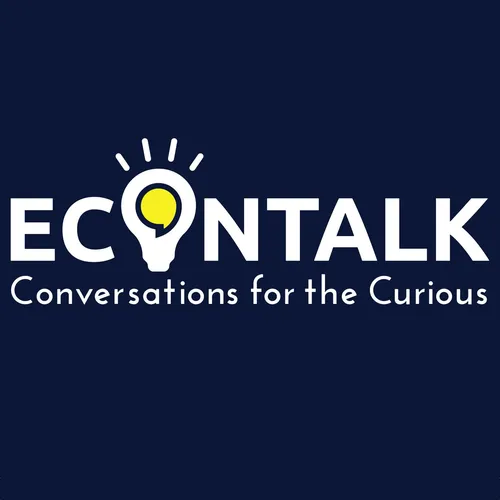
EconTalk
EconTalk: Conversations for the Curious is an award-winning weekly podcast hosted by Russ Roberts of Shalem College in Jerusalem and Stanford's Hoover Institution. The eclectic guest list includes authors, doctors, psychologists, historians, philosophers, economists, and more. Learn how the health care system really works, the serenity that comes from humility, the challenge of interpreting data, how potato chips are made, what it's like to run an upscale Manhattan restaurant, what caused the 2008 financial crisis, the nature of consciousness, and more. EconTalk has been taking the Monday out of Mondays since 2006. All 900+ episodes are available in the archive. Go to EconTalk.org for transcripts, related resources, and comments.
- Update frequency
- every 7 days
- Average duration
- 68 minutes
- Episodes
- 1014
- Years Active
- 2006 - 2025

Tyler Cowen on Talent
How do you hone your craft on an everyday basis? It could be writing, meeting with experts, even listening to podcasts, just so long, argues economist and blogger Tyler Cowen, as it makes you better …

Russ Roberts and Mike Munger on Wild Problems
Waze and Google Maps tell us the best way to get to where we're going. But no app or algorithm can tell us whether we should head there in the first place. To economist Russ Roberts, the reason is si…

Gerd Gigerenzer on How to Stay Smart in a Smart World
IBM's super-computer Watson was a runaway success on Jeopardy! But it wasn't nearly as good at diagnosing cancer. This came as no surprise to Max Planck Institute psychologist Gerd Gigerenzer, who ar…

John List on Scale, Uber, and the Voltage Effect
Economist John List of the University of Chicago talks about his book, The Voltage Effect, with EconTalk host Russ Roberts. He discusses what determines scalability and argues that the only good idea…

Vinay Prasad on the Pandemic
When it comes to the COVID-19 vaccination, is the risk of myocarditis greater than the benefit to a healthy male teen? Is natural immunity really better than vaccination--and were we right to mask th…

Nassim Nicholas Taleb on the Nations, States, and Scale
A language, a flag, a national anthem and shared history—like a heart that has to pump harder to support a heavier body, the bigger a nation gets, the harder to curate an identity. Nassim Nicholas Ta…

Ran Abramitzky and Leah Boustan on Immigration Then and Now
Immigration to the United States, say Ran Abramitzky and Leah Boustan, is more novel than short story: It takes decades for new immigrants to catch up economically. But their kids on average thrive e…

A.J. Jacobs on Solving Life's Puzzles
How much of life can be solved by algorithms, and how much just can't be solved? Listen as A.J. Jacobs, author of The Puzzler, talks with EconTalk host Russ Roberts about the lessons he learned from …

Roosevelt Montás on Rescuing Socrates
How do books change our lives? Educator and author Roosevelt Montás of Columbia University talks about his book Rescuing Socrates with EconTalk host Russ Roberts. Drawing on his own educational and l…

Sridhar Ramaswamy on Google, Search, and Neeva
Former Google ads boss Sridhar Ramaswamy says that we live in a world that seems to give out free content when we use a search engine. But that world comes with a hidden cost--search results that dis…

Matti Friedman on Leonard Cohen and the Yom Kippur War
In October 1973, an unhappy Leonard Cohen was listening to the radio on his Greek island home when he heard that Israel was at war. He headed to Tel Aviv, exchanging a personal and creative crisis fo…

Ian Leslie on Curiosity
Why are some people incurious? Is curiosity a teachable thing? And why, if all knowledge can be googled, is curiosity now the domain of a small elite? Listen as Ian Leslie, author of Curious, talks w…

Diane Coyle on Cogs, Monsters, and Better Economics
Mainstream economics, says author Diane Coyle, keeps treating people like cogs: self-interested, rational agents. But in the digital economy, we're less sophisticated consumer and more monster under …

Marc Andreessen on Software, Immortality, and Bitcoin
What's the single best thing happening in technology right now? According to entrepreneur and venture capitalist Marc Andreessen, it's the ability to live in rural Wisconsin but still earn a Silicon …

Chris Blattman on Why We Fight
It's tempting to explain Russia's invasion of Ukraine with Putin's megalomania. Economist Chris Blattman of the University of Chicago talks about his book Why We Fight with EconTalk host Russ Roberts…

Dwayne Betts on Ellison, Levi, and Human Suffering
In his memoir of his time in Auschwitz, Primo Levi describes Jewish prisoners bathing in freezing water without soap--not because they thought it would make them cleaner, but because it helped them h…

Michael Munger on Antitrust
Are tech giants such as Google, Amazon, or Facebook dangerous? Do they have too much power? Dive into the murky waters of antitrust as Michael Munger of Duke University talks with EconTalk host Russ …

Tyler Cowen on Reading
Intellectual omnivore Tyler Cowen of George Mason University and EconTalk host Russ Roberts talk about their reading habits, their favorite books, and the pile of books on their nightstands right now…

Russ Roberts on Education
What do crossing rivers and investing in stocks have in common? Real education is seeing the connection between things that seem very different. EconTalk's host Russ Roberts talks about education wit…

Richard Gunderman on Greed, Adam Smith, and Leo Tolstoy
Physician and careful reader Richard Gunderman of Indiana University talks with EconTalk host Russ Roberts about how Adam Smith and Leo Tolstoy looked at greed. Drawing on Tolstoy's short story, "Mas…